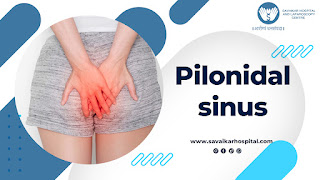Pilonidal sinus
While 26-year-old Suneel had been a cab driver for 3 years, of late he started to feel pain in his natal area when sitting. Initially, he thought that it was a boil/ pimple that had developed near his buttocks, but the pain slowly seemed to be growing. A week later when he visited Savaikar Hospital, he discovered he had Pilonidal sinus. Suneel was taken aback, as he had always been very careful about his physical hygiene. But the doctors made him understand the various reasons that could be behind the discomfort. A timely intervention proved to be very helpful, as Suneel’s condition could be treated with a few weeks of medication.
The Italian term “Pilonidal sinus” basically means a hair nest. Ingrown hair is probably the main reason for the disease too. While not very common, pilonidal sinus is usually found in males aged 20 to 30 years. A small hole in the skin, it occurs on the upper side of the cleft of the buttocks. This hole can fill up with pus, further forming a cyst and thus becoming painful. If the cyst becomes infected, foul-smelling pus or blood may ooze.
Also called PNS, pilonidal sinus is most commonly found in young males who spend a lot of time sitting. While the exact reasons are still unclear, it is believed that hair growth, changing hormones related to puberty, and friction from clothes can often cause pilonidal sinus.
What are the common symptoms of Pilonidal sinus?
The most common symptom of PNS is a lot of pain and soreness in the affected area. If you notice any dimple-like depression in the natal cleft you should seek medical assistance. If you have pain or swelling in the buttock area and develop a fever, it is most likely that the cyst has filled with an abscess.
What risk factors should I watch out for?
While young males are most likely to get pilonidal sinus, one may watch out for the following risk factors:
●Genetics
●Long sitting hours
●Deep natal cleft
●Obesity
●Copious hair.
How will the Pilonidal sinus be treated?
Just like in Suneel’s case, if your PNS is diagnosed timely, which means that it is not affected yet, then it can be treated with medicines. However, conventional surgery may be required under local anaesthesia if it is infected.
Is there any way to prevent Pilonidal sinus?
As discussed earlier, because there is no exact cause of Pilonidal sinus, prevention may not always be possible. However, maintaining proper hygiene is believed to be effective. Make sure you keep the sacrococcygeal area clean, dry and preferably free of hair.
If you are suffering from any soreness in the natal cleft of your buttocks, it is recommended that you seek timely medical help. The right treatment at the right time can save you from a lot of discomfort and inconvenience.

